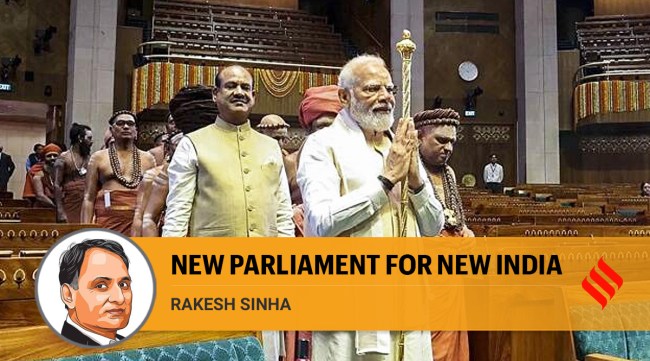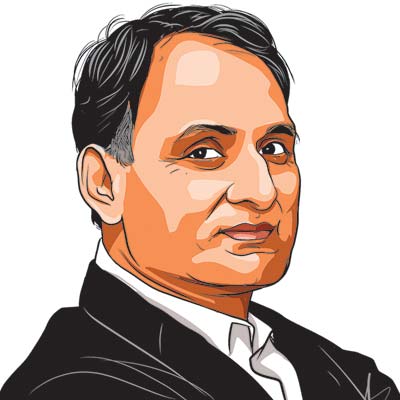Opinion BJP’s Rakesh Sinha writes: New Parliament building is a symbol of the Modi era
The new Parliament building is not an isolated project. It is part of the holistic efforts of the BJP government to renew nationalist fervour
 The new Parliament building is a departure from the earlier mask of “continuity with change”. (PTI)
The new Parliament building is a departure from the earlier mask of “continuity with change”. (PTI) A transition can be painful, especially for those who resist it. It is also unlikely to be free of confrontations. This has been particularly evident since the BJP came to power in 2014. The anguish, resistance and open confrontations both within the country and outside are there to see. The resisters use the intellectual power they have honed over seven decades of their rule to deploy a propaganda barrage against the Modi era. The reason for their attitude is not merely being ousted from power but the fact that there has been a radical shift in the ideological basis of the Indian state.
The Nehruvian state had shown an affinity for European liberals, institutions and thoughts. In return, it derived legitimacy from them. Narendra Modi on the other hand challenged colonial ideas and institutions, which had continued before he became PM under the facade of “continuity with change”. He consolidated India’s soft power, using its history and liberated institutions from their Eurocentric bent. This is something the people had been waiting for since 1947. The new Parliament building is not merely replacing its predecessor because the latter did not have enough space and facilities for its members. There are larger issues involved, which do not come up for discussion due to the superficial chorus against change by the Opposition.
The Congress articulates the impact of colonialism only in political and economic terms. It consciously avoided understanding its impact on cultures, ideas and institutions. This is why Nehruvian intellectuals have no option but to take shelter in the Constitution while defining India and Indianness. The state and society under Nehru looked towards the West to define democracy, secularism and, above, all culture. In 1931, philosopher K C Bhattacharya said in a lecture: “There is, however, a subtler domination exercised in the sphere of ideas by one culture on another, a domination all the more serious in the consequence, because it is not ordinarily felt.” His words are apt even today. The dominant leadership of the freedom movement crushed cultural nationalists like Bipin Chandra Pal, Bal Gangadhar Tilak and Aurobindo Ghosh, who cherished Indian values. It is the feeling of suppression stemming from this subjugation that unites people and gives strength to the vision and actions of PM Modi.
Colonial rule was barbaric. The history of the freedom movement, as was popularised in India till recently, is ahistorical in the sense that it presented selective narratives of struggle and coercion. This was deliberate. Nehru ignored the collective will of the people and dragged India into the Commonwealth, which is led by the unelected King/Queen of Britain. K T Shah’s question during the Constituent Assembly debates remains unanswered: “Why should we at this stage accept even the symbolic headship of the British King?” The Commonwealth was a melting pot, meant for the former colonies to accept their foes as guides, philosophers and friends. It is a symptom of why the colonial mindset cast a shadow on our intellectuals and governing elites. Modi has dissipated this shadow and placed the bright light of the Indian knowledge tradition in the spotlight. This infuriates not only certain people in India, but also certain sections and forces abroad.
The new Parliament building is a departure from the earlier mask of “continuity with change”. It is a reminder that the old building was the seat of power of those who framed laws and approved actions to crush the people. Its place as a museum will be the beginning of the rewriting of history on our own terms. In a sense, the compatibility of Modi’s vision with Marxist thinker Frantz Fanon’s worldview is a great coincidence.
The construction of the new Parliament building is not an isolated project. It is part of the holistic efforts of the BJP government to renew nationalist fervour. The Tiranga Yatra and Amrit Mahotsav are two other recent examples. Hundreds of unsung freedom fighters and incidences of struggle and sacrifice have been celebrated. The government also discarded 1,700 laws framed during the colonial era.
The Opposition parties’ attacks on the new building lack conviction and consistency. Earlier, they questioned the money that was spent. In this, they failed to garner the support of the taxpayers whose “losses” they invoked. The “taxpayer” is not merely an economic actor, but rather an idea – a cultural chorus – that draws its identity not just from the Constitution but also India’s civilisation and culture. Congress, in particular, has failed to grasp this idea despite the lack of support for its ideology – something the RSS did in 1925. Congress’s victory in Karnataka is not an endorsement of its moribund secularism – the party was lucky this time because of certain uniquely local, and time-specific factors.
The Opposition’s attack on the PM inaugurating the building lacks a logical basis. In every parliamentary democracy, the Prime Minister is at the centre. So, how do they justify the boycott of the inauguration by demanding that it be done by the President of India? The Congress sheds crocodile tears – it has consistently devalued the office of the President.
Nehru wrote letters to Chief Ministers, asking them not to attend the inauguration (shilanyas) of the Somnath temple in Gujarat by the first President of India, Rajendra Prasad. It is now known that President Fakhruddin Ali Ahmed was forced to sign the Emergency proclamation without a cabinet meeting and formal approval. K K Tiwari’s (a Union minister under Rajiv Gandhi) outburst against President Giani Zail Singh is well known.
Indian politics’ transition from the Nehruivian era to the Modi era is backed by the people – the latter addresses their cultural and civilisational concerns.
A circular issued by Congress on the eve of the 15th August 1947, read: “… we have to celebrate 15th August in such a way that people’s psychology is metamorphosed into that befitting citizens of independent nation… our destiny now lies in our own hands. We now have to build a strong and prosperous nation. We have to establish a democratic polity… we have to remove gross inequities and eliminate poverty and unemployment… we have to empower the people… all these aspirations and expectations can not be fulfilled overnight.”
At Independence, the Congress did not promise to restore Indian identity and the question remained suppressed till 2014. Mahatma Gandhi kept largely away from the celebrations. However, the Opposition (except the Communists) joined Nehru and his government despite scores of differences. That spirit is no longer present in the Opposition of today. It is, instead, contributing to a democratic decline.
While Nehru carried and propounded a modified version of the colonial “civilising mission”, Modi marches ahead with a civilisational mission, which is the quest for New India.
The writer is a BJP Rajya Sabha MP





